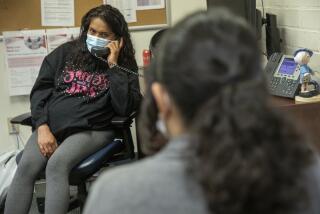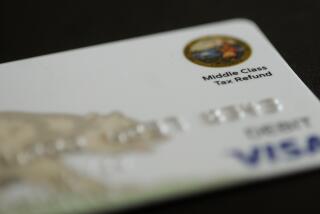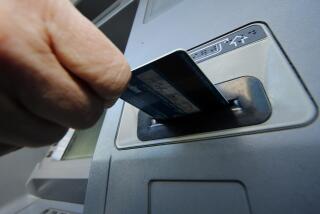The Big Disconnect in Calling-Card Claims
- Share via
Many people who use prepaid phone cards to keep in touch with relatives and friends in other countries complain that the discount plans often provide less calling time than promised.
The cards have become increasingly popular--especially in immigrant communities--because they offer long-distance phone rates at about half the price of dialing the number at home.
The state’s Public Utilities Commission and several consumer groups believe some companies are cheating customers by deliberately promising more minutes of phone service than the cards actually provide.
“I’ve called and been cut off after barely saying hello,” said Patricia Mendez of Santa Ana, who uses the cards to call her native Guatemala with varied success. “You have to wonder how they measure the time.”
The PUC received dozens of complaints last year from disgruntled customers, but lawmakers like Assemblyman Lou Correa (D-Anaheim) believe the problem is much more pervasive and that immigrants simply don’t make formal complaints.
A law that went into effect in 1999 was designed to crack down on phone-card companies by tightening rules and giving the PUC the right to fine companies who practice deceptive advertising.
But Correa is now considering new legislation that would require companies to post larger bonds with the state and offer improved 24-hour customer service.
Even some in the phone-card industry believe more aggressive government action is needed to weed out unscrupulous operators.
“We are very concerned there is not enough punishment,” said Howard Segermark, executive director of the International Telecard Assn., which represents companies that sell prepaid phone cards. “We know there are problems out there.”
*
Federal regulators, who have helped New York and other states combat misleading advertising for phone cards, concur. “As far as regulatory agencies go, not too much is being done,” said Carole Paynter, an attorney with the Federal Trade Commission. “It is something we still need to look at.”
Complicating matters is the fact that even when the phone cards fail to provide the time advertised, they are still often cheaper than placing the call through a home phone.
As a result, many consumers put up with problems, learning which of the dozens of brands they can trust.
“It’s sort of playing the lottery. Sometimes you win, sometimes you don’t,” said Alicia Cortez, who sells cards at International Travel and Auto Insurance in Santa Ana. “The fact is, a lot of people don’t speak English and they don’t have the custom of complaining.”
Francisco Guiterrez, a 32-year-old construction worker from Jalisco, Mexico, buys phone cards because they can get him connected to his hometown for 12 cents a minute, compared to 30 cents to $1 a minute for a regular home phone.
He said that recently he called his mother’s house with a card that promised 30 minutes of talk time, but the card was inoperable after a few minutes.
Martin Loera, 25, said he repeatedly calls the 800 number on the back of the cards to demand more time from the companies. Often they oblige.
“You do have to fight a bit to get what you are owed. It’s not something that is given,” he said. “It’s sort of crazy that we let ourselves get trapped in this system.”
The prepaid cards come in denominations as low as $1 and as high as $20.
To use them, callers first dial a toll-free number on the card, then enter a personal identification number and the number they want to reach.
Consumers learn their balances from a computerized voice system.
The state has never fined or filed criminal charges against providers of prepaid phone cards. But the Public Utilities Commission said it is currently examining reported problems with several companies.
The state attorney general’s office said it is also looking into the issue and urged customers with problems to contact officials.
“We are concerned about the false and misleading advertising . . . [and] inadequate disclosures to the consumer about how much the calls will really cost,” said Sandra Michioku, a spokeswoman for the office.
*
New York state prosecutors have won financial settlements from a company that admitted false advertising practices.
PT-1 Communications, a carrier based in Brooklyn, agreed to pay $300,000.
The FTC charged that while the company regularly advertised its prepaid phone cards with per-minute rates of 19 cents, the actual rate was higher because of hidden connection fees and monthly charges.
Michael Linfield, a Pasadena consumer protection attorney, has filed a civil lawsuit against one company seeking restitution for thousands of consumers, saying regulators are not moving fast enough.
“There are many companies that are targeting immigrants or low-income consumers,” he said. “It just makes it more outrageous. They will pay more and no one complains. They are guessing that it is a community they can afford to rip off.”
More to Read
Sign up for Essential California
The most important California stories and recommendations in your inbox every morning.
You may occasionally receive promotional content from the Los Angeles Times.













